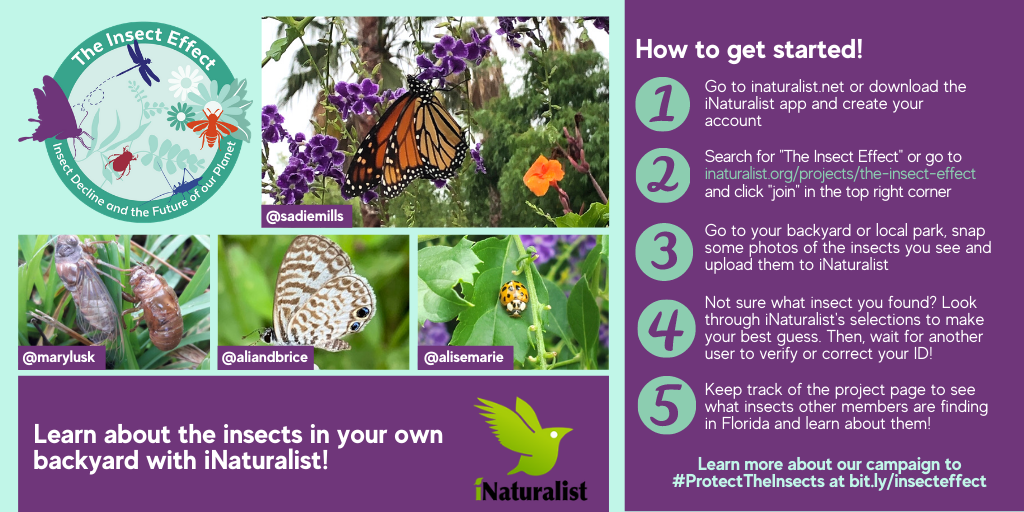While many insects can seem like pests, they provide a wide range of services to other plants and animals in our environment.
For this month’s Action of the Month, we invite you to share the insect discoveries in your yard through our Insect Effect iNaturalist Bioblitz and learn more about our campaign to #ProtectTheInsects at bit.ly/insecteffect!

Here’s how to get involved:
- Go to inaturalist.net or download the iNaturalist app and create your account.
- Search for “The Insect Effect” or go to inaturalist.org/projects/the-insect-effect and click “join” in the top right corner.
- Go to your backyard or local park, snap some photos of the insects you see and upload them to iNaturalist.
- Not sure what insect you found? Look through iNaturalist’s selections to make your best guess. Then, wait for another user to verify or correct your ID!
- Keep track of the project page to see what insects other members are finding in Florida and learn about them!
See below for Frequently Asked Questions about this Bioblitz:
Why should I help to protect the insects?
Along with plants, insects are at the foundation of the food web, and most of the plants and animals we eat rely on insects for food or pollination. If a dollar value was put on the services insects provide, this would equal roughly $70 billion in the U.S. alone. But, both the number and diversity of insects are declining around the globe due to habitat loss, pollution and climate change. Without widespread action, many of these important creatures that are critical to the survival of life on Earth could face extinction within the next few decades.
What is a BioBlitz?
A BioBlitz is an event with a goal to find and identify species in a given community over a specific period of time.
What is iNaturalist?
A popular app and website made in collaboration with the California Academy of Sciences and National Geographic that allows users to upload photos of plants and animals and helps you identify them. If you don’t know the name of the species you saw, the program will analyze your photo and try to make a suggestion for what it could be. After that, others can confirm or deny the identification and offer an alternative ID.
iNaturalist also helps scientists working to better understand and protect nature with valuable data.
Go to youtu.be/eS_9KpXgPdk for a video tutorial on how to start using iNaturalist.
Does iNaturalist use my location? Can I make my location private?
Yes, for its default setting, when you post a new photo, iNaturalist uses your geolocation to accurately identify where the plant or animal was seen. This is a great help to researchers using iNaturalist for their data. However, there are options for those concerned about privacy. When posting your photo, you will see “Location Visibility: Open.” If you click on this, you can change it to either “Obscured” or “Private” instead. When your location is “Obscured” only you can see your true coordinates, and others see coordinates for a randomly selected point nearby. When your location is “Private” coordinates are entirely hidden from public maps. In both of these settings, only iNaturalist, trusted users, and trusted project curators have access to the true coordinates of the photo.
To learn more about geolocation on iNaturalist, visit inaturalist.org/pages/help and see FAQ #8 What is geoprivacy.
Why aren’t my photos of spiders and other bugs being added to the project?
Many of the creatures we think of as bugs aren’t actually insects. Insects or Insecta, are a specific class within the Arthropod phylum and must have specific biological requirements to fit in this group. While spiders are also Arthropods, they belong to the class Arachnida. This project is focused specifically on the Insecta class. We encourage you to upload all of your findings to your personal iNaturalist account, however, or to help by joining other iNaturalist projects.
And, don’t forget to take our pledge to #ProtectTheInsects!
By signing our pledge, you commit to taking small actions that help protect insects near you.
BONUS! Those who sign the pledge by November 30, 2020, will be entered into a series of random drawings to receive a pack of Insect Effect stickers or a Protect the Insects yard sign (pictured). If you are randomly selected, we will contact you via email to arrange prize distribution.